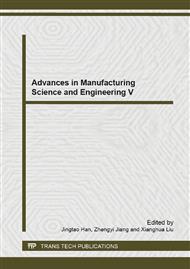[1]
R. Gessing, Stepwise Return of Integrator Output as a Competition to Antiwindup, Proceedings of the American Control Conference, Denver, Colorado, PP. 1230~1235, June 4-6, (2003).
DOI: 10.1109/acc.2003.1239756
Google Scholar
[2]
Maorui Zhang, Canghua Jiang, Problem and its solution for actuator saturation of integrating process with dead time, ISA Transactions 47 (2008), PP. 80–84 , (2008).
DOI: 10.1016/j.isatra.2007.05.004
Google Scholar
[3]
Maorui Zhang, Anti-windup Design in Modified Smith Predictor for Integrating Process with Dead Time, Second IEEE Conference on Industrial Electronics and Applications, PP. 176~179, (2007).
DOI: 10.1109/iciea.2007.4318393
Google Scholar
[4]
X. Duan, H. Li, H. Deng, Robustness of fuzzy PID controller due to its inherent saturation, Journal of Process Control, Vol 22, n 2, PP. 470-476, February (2012).
DOI: 10.1016/j.jprocont.2011.12.001
Google Scholar
[5]
H. Shin, J. Park, Anti-windup PID controller with integral state predictor for variable-speed motor drives, IEEE Transactions on Industrial Electronics, Vol 59, n 3, PP. 1509-1516, March (2012).
DOI: 10.1109/tie.2011.2163911
Google Scholar
[6]
Nassirharand, Amir, Design of self-tuning controllers for highly non-linear mechatronic systems, International Journal of Modelling, Identification and Control, Vol 13, n 4, PP. 291-300, August (2011).
DOI: 10.1504/ijmic.2011.041784
Google Scholar
[7]
K. Saadaui, S. Testouri, M. Benrejeb, Robust stabilizing first order controllers for a class of time delay systems, ISA Transactions, (2010).
DOI: 10.1016/j.isatra.2010.02.001
Google Scholar
[8]
J. C. Moreno, A. Baños, M. Berenguel, A QFT Framework for Antiwindup Control Systems Design, Transactions of the ASME, 021012-2 /, Vol. 132, MARCH (2010).
DOI: 10.1115/1.4000812
Google Scholar


